Reflection on Practice Portfolio: Psychiatric Nursing at University
VerifiedAdded on 2020/04/07
|14
|3181
|49
Report
AI Summary
This report provides a reflective analysis of a student's experiences in a psychiatric nursing setting. It begins with a personal reflection on the values and challenges of the profession, emphasizing the need for compassion and the complexities of patient interactions. The report then delves into a specific patient scenario involving a patient with schizophrenia, dementia, and hyponatremia, utilizing the Rolfe Model to analyze the situation, the student's actions, and the outcomes. Furthermore, the report includes an analysis of a newspaper article discussing patient abuse at a mental health facility, connecting the incident to broader issues of social stigma surrounding mental illness and the ethical responsibilities of healthcare professionals. The student reflects on their role, the importance of patient advocacy, and the need for ethical conduct within the psychiatric ward, drawing on relevant literature to support their insights.
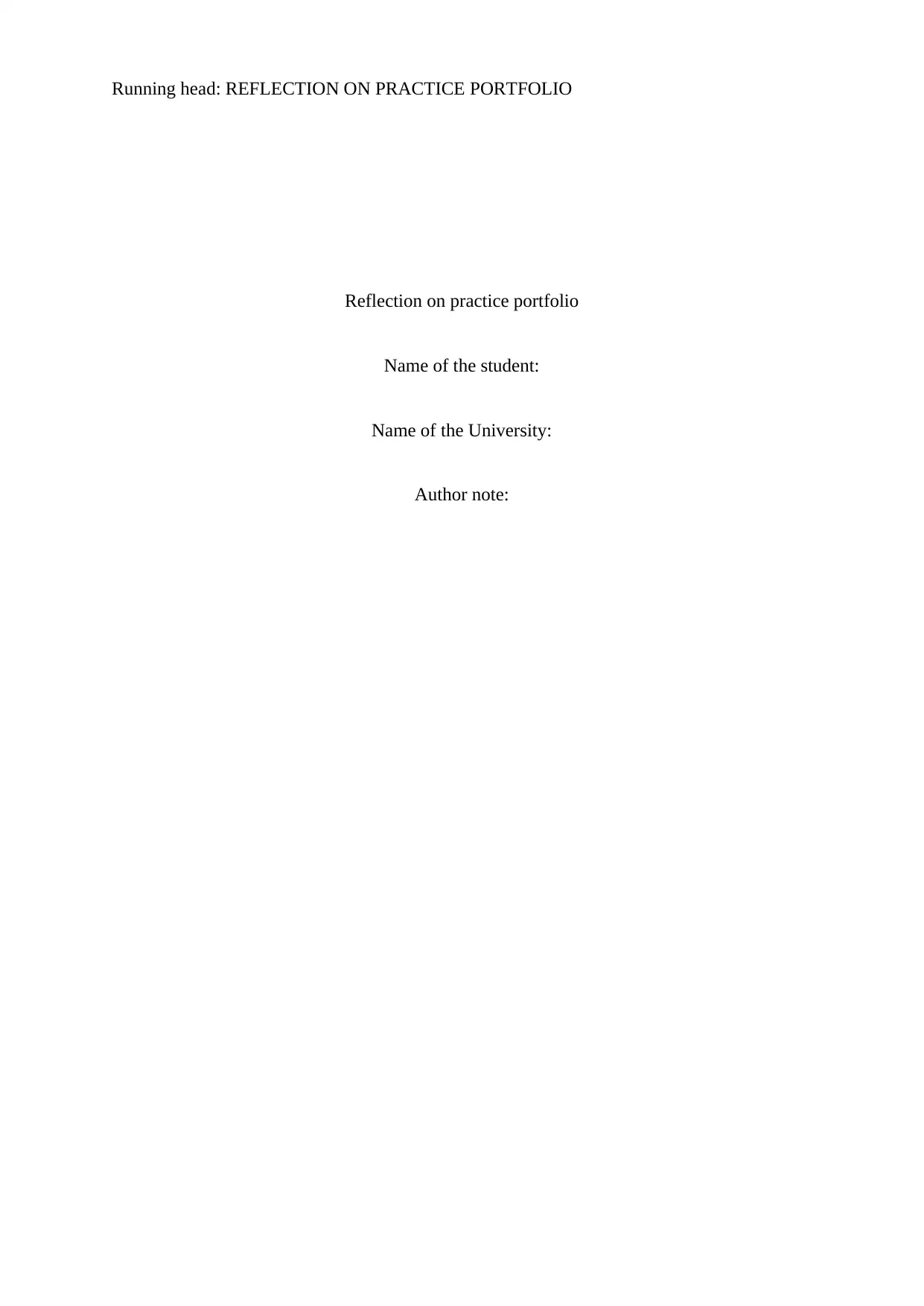
Running head: REFLECTION ON PRACTICE PORTFOLIO
Reflection on practice portfolio
Name of the student:
Name of the University:
Author note:
Reflection on practice portfolio
Name of the student:
Name of the University:
Author note:
Paraphrase This Document
Need a fresh take? Get an instant paraphrase of this document with our AI Paraphraser
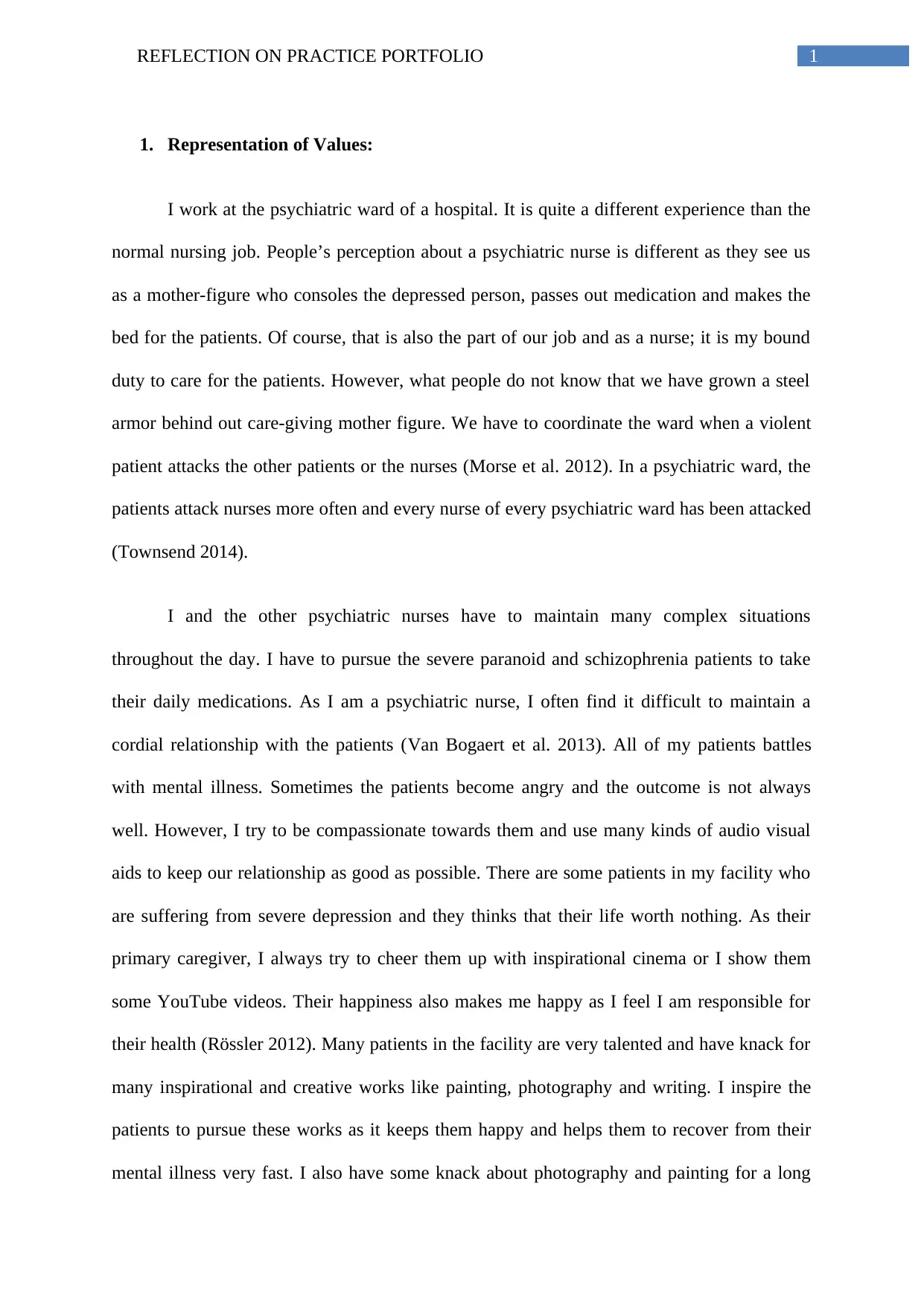
1REFLECTION ON PRACTICE PORTFOLIO
1. Representation of Values:
I work at the psychiatric ward of a hospital. It is quite a different experience than the
normal nursing job. People’s perception about a psychiatric nurse is different as they see us
as a mother-figure who consoles the depressed person, passes out medication and makes the
bed for the patients. Of course, that is also the part of our job and as a nurse; it is my bound
duty to care for the patients. However, what people do not know that we have grown a steel
armor behind out care-giving mother figure. We have to coordinate the ward when a violent
patient attacks the other patients or the nurses (Morse et al. 2012). In a psychiatric ward, the
patients attack nurses more often and every nurse of every psychiatric ward has been attacked
(Townsend 2014).
I and the other psychiatric nurses have to maintain many complex situations
throughout the day. I have to pursue the severe paranoid and schizophrenia patients to take
their daily medications. As I am a psychiatric nurse, I often find it difficult to maintain a
cordial relationship with the patients (Van Bogaert et al. 2013). All of my patients battles
with mental illness. Sometimes the patients become angry and the outcome is not always
well. However, I try to be compassionate towards them and use many kinds of audio visual
aids to keep our relationship as good as possible. There are some patients in my facility who
are suffering from severe depression and they thinks that their life worth nothing. As their
primary caregiver, I always try to cheer them up with inspirational cinema or I show them
some YouTube videos. Their happiness also makes me happy as I feel I am responsible for
their health (Rössler 2012). Many patients in the facility are very talented and have knack for
many inspirational and creative works like painting, photography and writing. I inspire the
patients to pursue these works as it keeps them happy and helps them to recover from their
mental illness very fast. I also have some knack about photography and painting for a long
1. Representation of Values:
I work at the psychiatric ward of a hospital. It is quite a different experience than the
normal nursing job. People’s perception about a psychiatric nurse is different as they see us
as a mother-figure who consoles the depressed person, passes out medication and makes the
bed for the patients. Of course, that is also the part of our job and as a nurse; it is my bound
duty to care for the patients. However, what people do not know that we have grown a steel
armor behind out care-giving mother figure. We have to coordinate the ward when a violent
patient attacks the other patients or the nurses (Morse et al. 2012). In a psychiatric ward, the
patients attack nurses more often and every nurse of every psychiatric ward has been attacked
(Townsend 2014).
I and the other psychiatric nurses have to maintain many complex situations
throughout the day. I have to pursue the severe paranoid and schizophrenia patients to take
their daily medications. As I am a psychiatric nurse, I often find it difficult to maintain a
cordial relationship with the patients (Van Bogaert et al. 2013). All of my patients battles
with mental illness. Sometimes the patients become angry and the outcome is not always
well. However, I try to be compassionate towards them and use many kinds of audio visual
aids to keep our relationship as good as possible. There are some patients in my facility who
are suffering from severe depression and they thinks that their life worth nothing. As their
primary caregiver, I always try to cheer them up with inspirational cinema or I show them
some YouTube videos. Their happiness also makes me happy as I feel I am responsible for
their health (Rössler 2012). Many patients in the facility are very talented and have knack for
many inspirational and creative works like painting, photography and writing. I inspire the
patients to pursue these works as it keeps them happy and helps them to recover from their
mental illness very fast. I also have some knack about photography and painting for a long
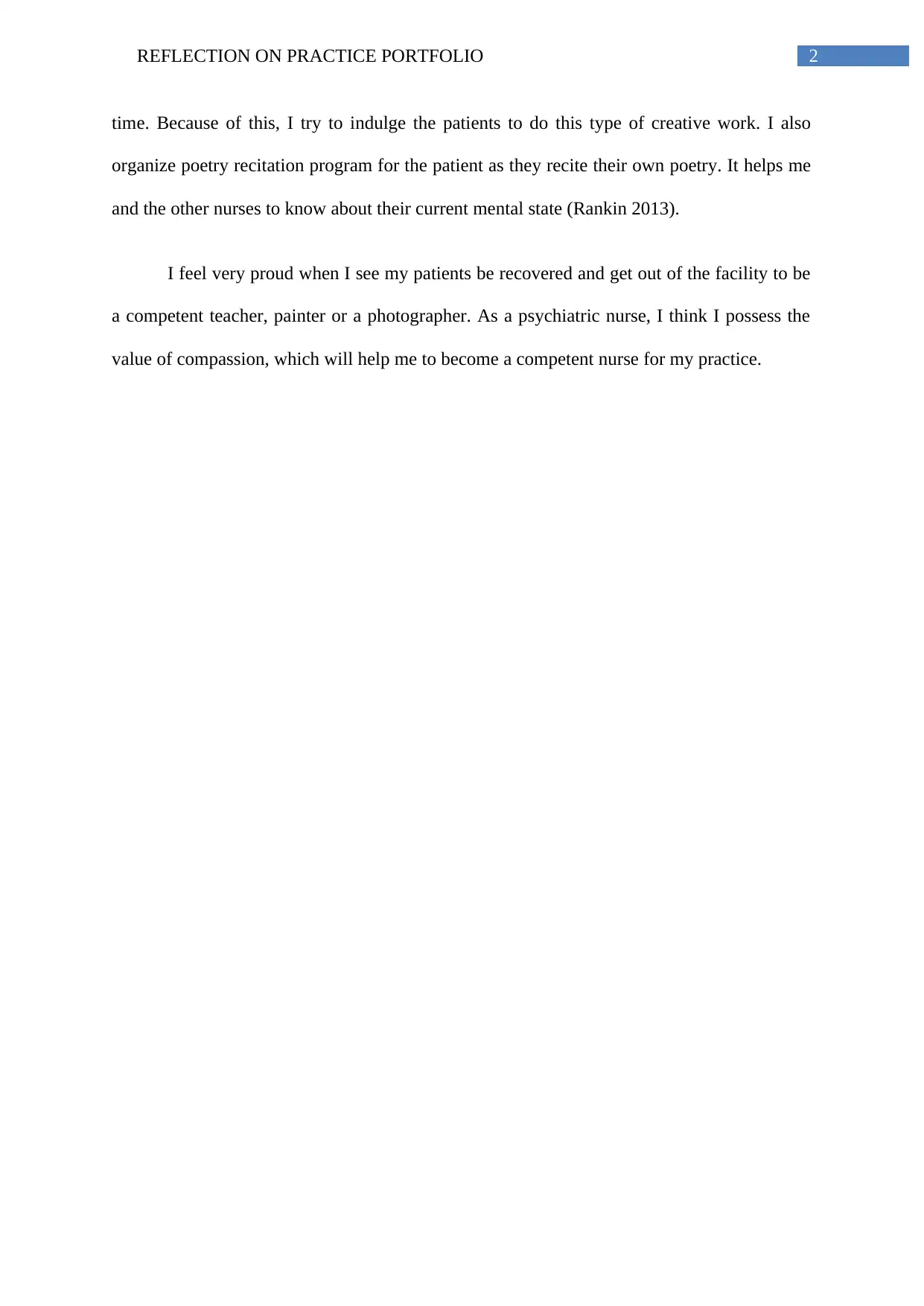
2REFLECTION ON PRACTICE PORTFOLIO
time. Because of this, I try to indulge the patients to do this type of creative work. I also
organize poetry recitation program for the patient as they recite their own poetry. It helps me
and the other nurses to know about their current mental state (Rankin 2013).
I feel very proud when I see my patients be recovered and get out of the facility to be
a competent teacher, painter or a photographer. As a psychiatric nurse, I think I possess the
value of compassion, which will help me to become a competent nurse for my practice.
time. Because of this, I try to indulge the patients to do this type of creative work. I also
organize poetry recitation program for the patient as they recite their own poetry. It helps me
and the other nurses to know about their current mental state (Rankin 2013).
I feel very proud when I see my patients be recovered and get out of the facility to be
a competent teacher, painter or a photographer. As a psychiatric nurse, I think I possess the
value of compassion, which will help me to become a competent nurse for my practice.
⊘ This is a preview!⊘
Do you want full access?
Subscribe today to unlock all pages.

Trusted by 1+ million students worldwide
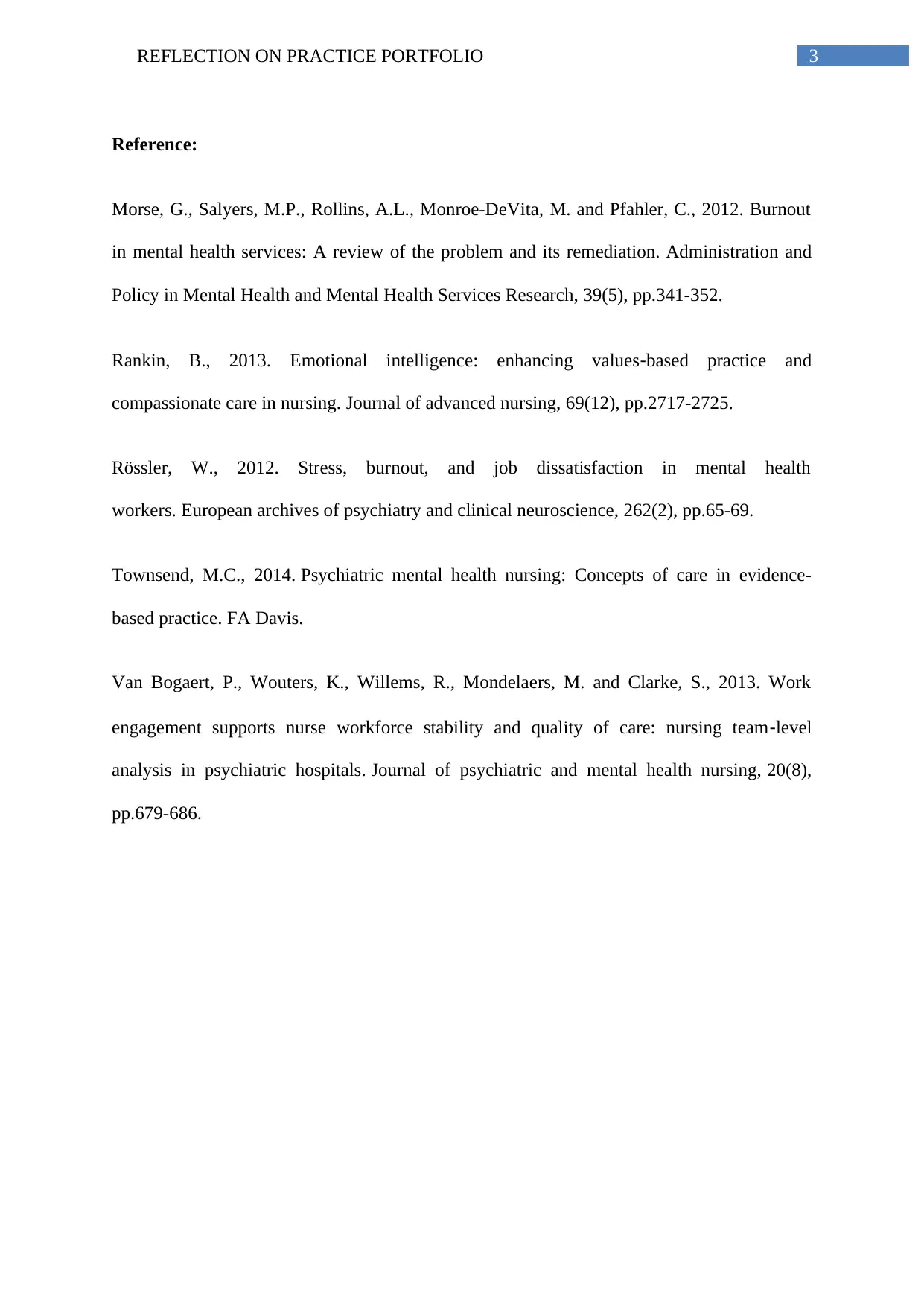
3REFLECTION ON PRACTICE PORTFOLIO
Reference:
Morse, G., Salyers, M.P., Rollins, A.L., Monroe-DeVita, M. and Pfahler, C., 2012. Burnout
in mental health services: A review of the problem and its remediation. Administration and
Policy in Mental Health and Mental Health Services Research, 39(5), pp.341-352.
Rankin, B., 2013. Emotional intelligence: enhancing values‐based practice and
compassionate care in nursing. Journal of advanced nursing, 69(12), pp.2717-2725.
Rössler, W., 2012. Stress, burnout, and job dissatisfaction in mental health
workers. European archives of psychiatry and clinical neuroscience, 262(2), pp.65-69.
Townsend, M.C., 2014. Psychiatric mental health nursing: Concepts of care in evidence-
based practice. FA Davis.
Van Bogaert, P., Wouters, K., Willems, R., Mondelaers, M. and Clarke, S., 2013. Work
engagement supports nurse workforce stability and quality of care: nursing team‐level
analysis in psychiatric hospitals. Journal of psychiatric and mental health nursing, 20(8),
pp.679-686.
Reference:
Morse, G., Salyers, M.P., Rollins, A.L., Monroe-DeVita, M. and Pfahler, C., 2012. Burnout
in mental health services: A review of the problem and its remediation. Administration and
Policy in Mental Health and Mental Health Services Research, 39(5), pp.341-352.
Rankin, B., 2013. Emotional intelligence: enhancing values‐based practice and
compassionate care in nursing. Journal of advanced nursing, 69(12), pp.2717-2725.
Rössler, W., 2012. Stress, burnout, and job dissatisfaction in mental health
workers. European archives of psychiatry and clinical neuroscience, 262(2), pp.65-69.
Townsend, M.C., 2014. Psychiatric mental health nursing: Concepts of care in evidence-
based practice. FA Davis.
Van Bogaert, P., Wouters, K., Willems, R., Mondelaers, M. and Clarke, S., 2013. Work
engagement supports nurse workforce stability and quality of care: nursing team‐level
analysis in psychiatric hospitals. Journal of psychiatric and mental health nursing, 20(8),
pp.679-686.
Paraphrase This Document
Need a fresh take? Get an instant paraphrase of this document with our AI Paraphraser
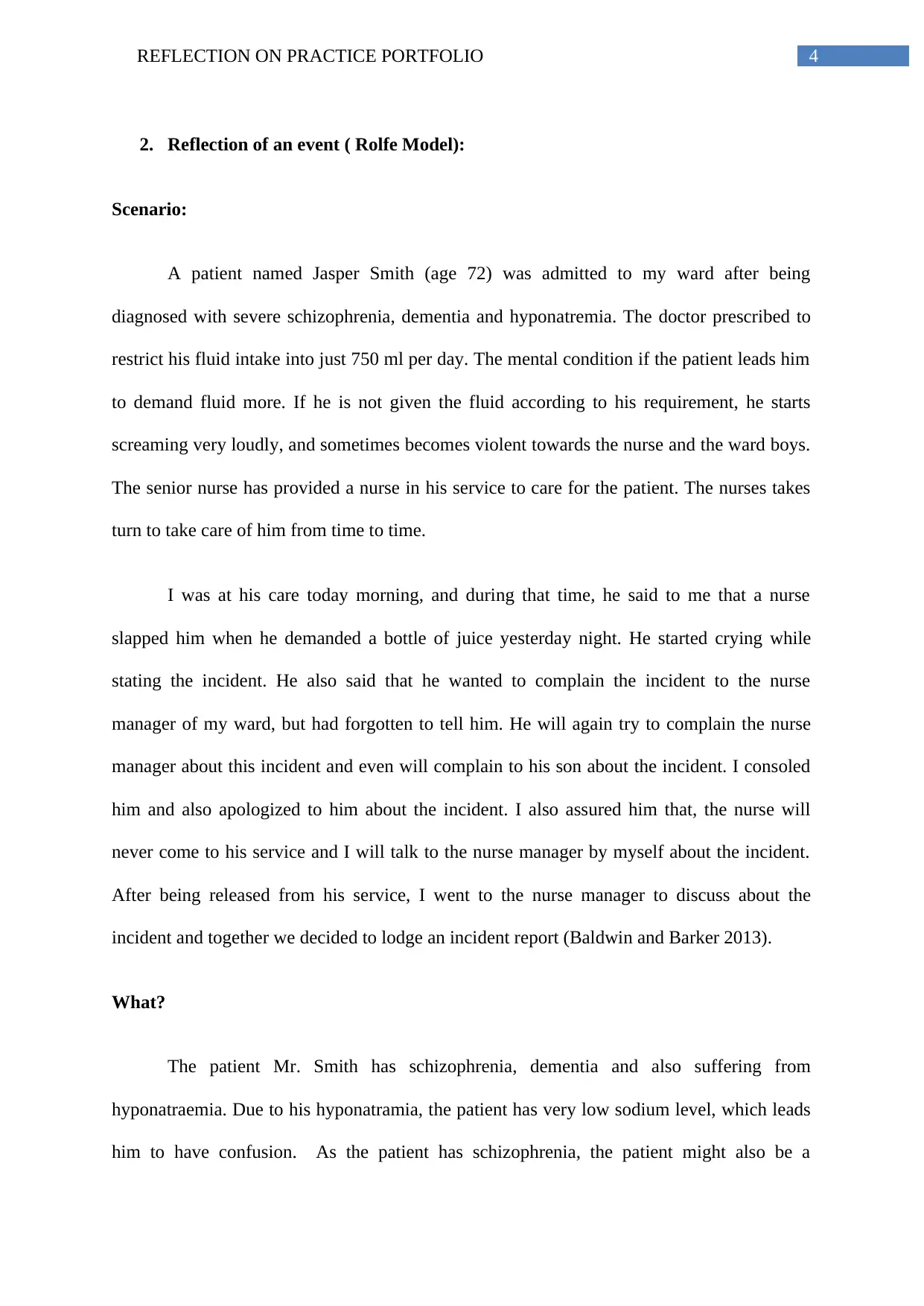
4REFLECTION ON PRACTICE PORTFOLIO
2. Reflection of an event ( Rolfe Model):
Scenario:
A patient named Jasper Smith (age 72) was admitted to my ward after being
diagnosed with severe schizophrenia, dementia and hyponatremia. The doctor prescribed to
restrict his fluid intake into just 750 ml per day. The mental condition if the patient leads him
to demand fluid more. If he is not given the fluid according to his requirement, he starts
screaming very loudly, and sometimes becomes violent towards the nurse and the ward boys.
The senior nurse has provided a nurse in his service to care for the patient. The nurses takes
turn to take care of him from time to time.
I was at his care today morning, and during that time, he said to me that a nurse
slapped him when he demanded a bottle of juice yesterday night. He started crying while
stating the incident. He also said that he wanted to complain the incident to the nurse
manager of my ward, but had forgotten to tell him. He will again try to complain the nurse
manager about this incident and even will complain to his son about the incident. I consoled
him and also apologized to him about the incident. I also assured him that, the nurse will
never come to his service and I will talk to the nurse manager by myself about the incident.
After being released from his service, I went to the nurse manager to discuss about the
incident and together we decided to lodge an incident report (Baldwin and Barker 2013).
What?
The patient Mr. Smith has schizophrenia, dementia and also suffering from
hyponatraemia. Due to his hyponatramia, the patient has very low sodium level, which leads
him to have confusion. As the patient has schizophrenia, the patient might also be a
2. Reflection of an event ( Rolfe Model):
Scenario:
A patient named Jasper Smith (age 72) was admitted to my ward after being
diagnosed with severe schizophrenia, dementia and hyponatremia. The doctor prescribed to
restrict his fluid intake into just 750 ml per day. The mental condition if the patient leads him
to demand fluid more. If he is not given the fluid according to his requirement, he starts
screaming very loudly, and sometimes becomes violent towards the nurse and the ward boys.
The senior nurse has provided a nurse in his service to care for the patient. The nurses takes
turn to take care of him from time to time.
I was at his care today morning, and during that time, he said to me that a nurse
slapped him when he demanded a bottle of juice yesterday night. He started crying while
stating the incident. He also said that he wanted to complain the incident to the nurse
manager of my ward, but had forgotten to tell him. He will again try to complain the nurse
manager about this incident and even will complain to his son about the incident. I consoled
him and also apologized to him about the incident. I also assured him that, the nurse will
never come to his service and I will talk to the nurse manager by myself about the incident.
After being released from his service, I went to the nurse manager to discuss about the
incident and together we decided to lodge an incident report (Baldwin and Barker 2013).
What?
The patient Mr. Smith has schizophrenia, dementia and also suffering from
hyponatraemia. Due to his hyponatramia, the patient has very low sodium level, which leads
him to have confusion. As the patient has schizophrenia, the patient might also be a
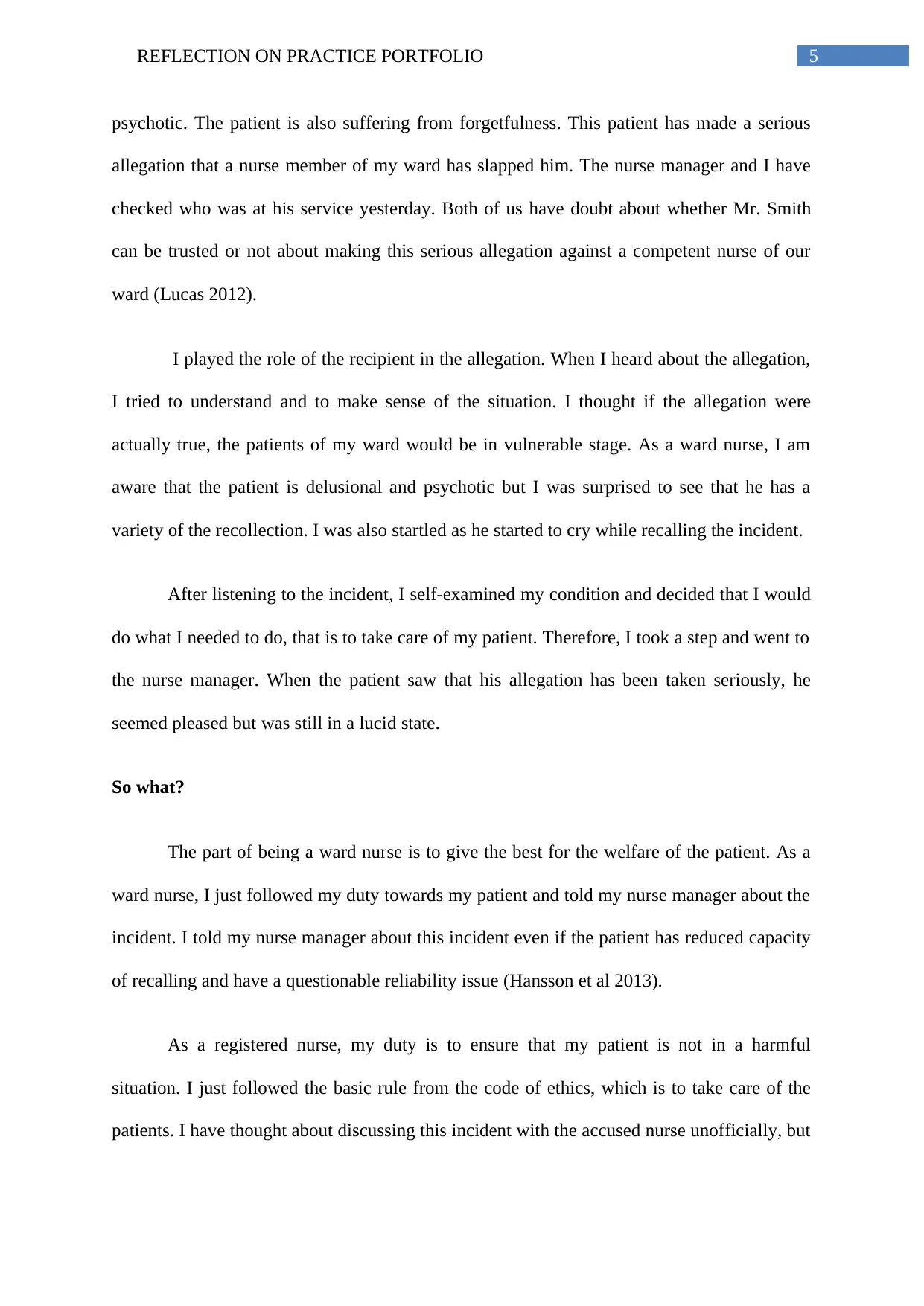
5REFLECTION ON PRACTICE PORTFOLIO
psychotic. The patient is also suffering from forgetfulness. This patient has made a serious
allegation that a nurse member of my ward has slapped him. The nurse manager and I have
checked who was at his service yesterday. Both of us have doubt about whether Mr. Smith
can be trusted or not about making this serious allegation against a competent nurse of our
ward (Lucas 2012).
I played the role of the recipient in the allegation. When I heard about the allegation,
I tried to understand and to make sense of the situation. I thought if the allegation were
actually true, the patients of my ward would be in vulnerable stage. As a ward nurse, I am
aware that the patient is delusional and psychotic but I was surprised to see that he has a
variety of the recollection. I was also startled as he started to cry while recalling the incident.
After listening to the incident, I self-examined my condition and decided that I would
do what I needed to do, that is to take care of my patient. Therefore, I took a step and went to
the nurse manager. When the patient saw that his allegation has been taken seriously, he
seemed pleased but was still in a lucid state.
So what?
The part of being a ward nurse is to give the best for the welfare of the patient. As a
ward nurse, I just followed my duty towards my patient and told my nurse manager about the
incident. I told my nurse manager about this incident even if the patient has reduced capacity
of recalling and have a questionable reliability issue (Hansson et al 2013).
As a registered nurse, my duty is to ensure that my patient is not in a harmful
situation. I just followed the basic rule from the code of ethics, which is to take care of the
patients. I have thought about discussing this incident with the accused nurse unofficially, but
psychotic. The patient is also suffering from forgetfulness. This patient has made a serious
allegation that a nurse member of my ward has slapped him. The nurse manager and I have
checked who was at his service yesterday. Both of us have doubt about whether Mr. Smith
can be trusted or not about making this serious allegation against a competent nurse of our
ward (Lucas 2012).
I played the role of the recipient in the allegation. When I heard about the allegation,
I tried to understand and to make sense of the situation. I thought if the allegation were
actually true, the patients of my ward would be in vulnerable stage. As a ward nurse, I am
aware that the patient is delusional and psychotic but I was surprised to see that he has a
variety of the recollection. I was also startled as he started to cry while recalling the incident.
After listening to the incident, I self-examined my condition and decided that I would
do what I needed to do, that is to take care of my patient. Therefore, I took a step and went to
the nurse manager. When the patient saw that his allegation has been taken seriously, he
seemed pleased but was still in a lucid state.
So what?
The part of being a ward nurse is to give the best for the welfare of the patient. As a
ward nurse, I just followed my duty towards my patient and told my nurse manager about the
incident. I told my nurse manager about this incident even if the patient has reduced capacity
of recalling and have a questionable reliability issue (Hansson et al 2013).
As a registered nurse, my duty is to ensure that my patient is not in a harmful
situation. I just followed the basic rule from the code of ethics, which is to take care of the
patients. I have thought about discussing this incident with the accused nurse unofficially, but
⊘ This is a preview!⊘
Do you want full access?
Subscribe today to unlock all pages.

Trusted by 1+ million students worldwide
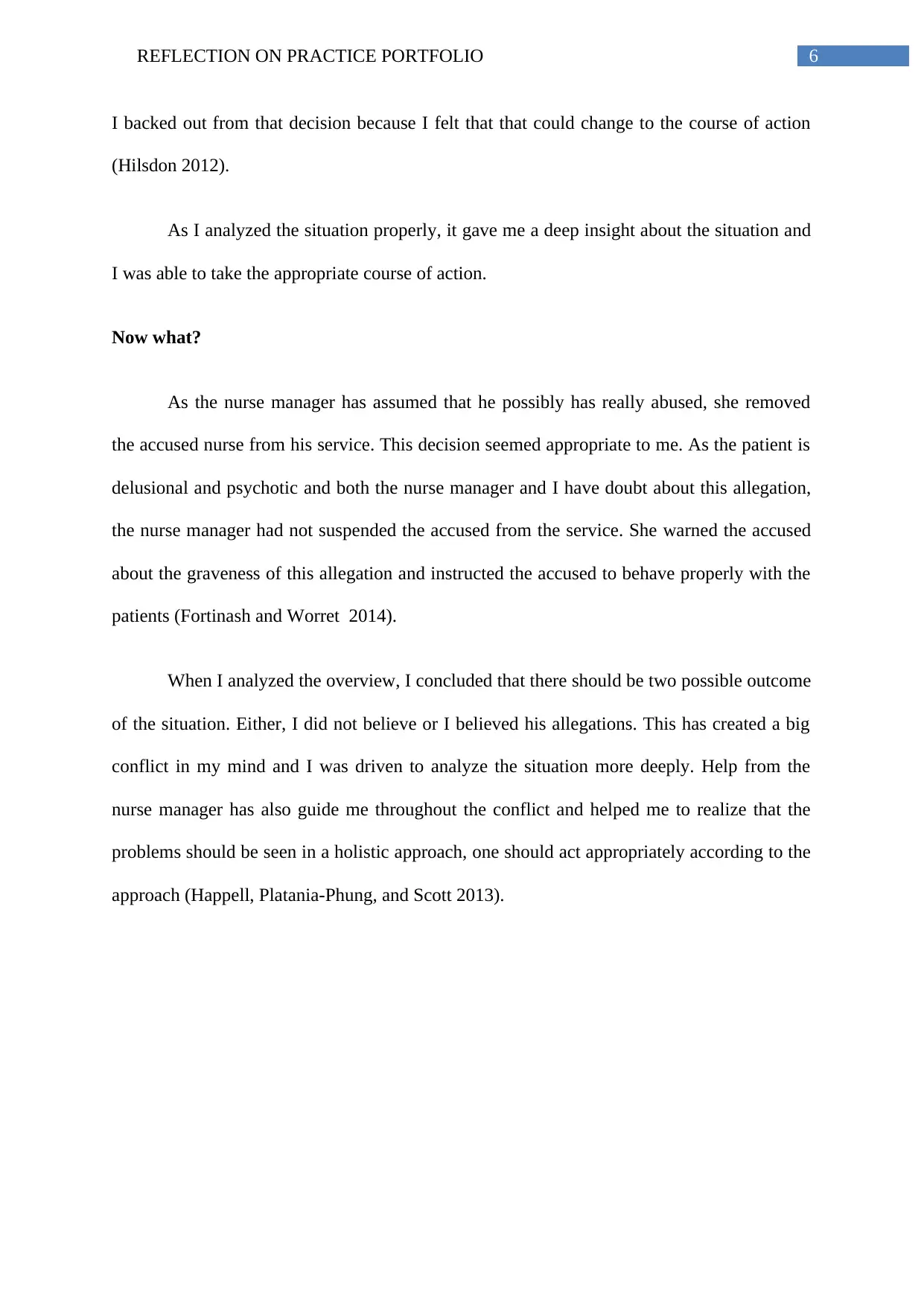
6REFLECTION ON PRACTICE PORTFOLIO
I backed out from that decision because I felt that that could change to the course of action
(Hilsdon 2012).
As I analyzed the situation properly, it gave me a deep insight about the situation and
I was able to take the appropriate course of action.
Now what?
As the nurse manager has assumed that he possibly has really abused, she removed
the accused nurse from his service. This decision seemed appropriate to me. As the patient is
delusional and psychotic and both the nurse manager and I have doubt about this allegation,
the nurse manager had not suspended the accused from the service. She warned the accused
about the graveness of this allegation and instructed the accused to behave properly with the
patients (Fortinash and Worret 2014).
When I analyzed the overview, I concluded that there should be two possible outcome
of the situation. Either, I did not believe or I believed his allegations. This has created a big
conflict in my mind and I was driven to analyze the situation more deeply. Help from the
nurse manager has also guide me throughout the conflict and helped me to realize that the
problems should be seen in a holistic approach, one should act appropriately according to the
approach (Happell, Platania-Phung, and Scott 2013).
I backed out from that decision because I felt that that could change to the course of action
(Hilsdon 2012).
As I analyzed the situation properly, it gave me a deep insight about the situation and
I was able to take the appropriate course of action.
Now what?
As the nurse manager has assumed that he possibly has really abused, she removed
the accused nurse from his service. This decision seemed appropriate to me. As the patient is
delusional and psychotic and both the nurse manager and I have doubt about this allegation,
the nurse manager had not suspended the accused from the service. She warned the accused
about the graveness of this allegation and instructed the accused to behave properly with the
patients (Fortinash and Worret 2014).
When I analyzed the overview, I concluded that there should be two possible outcome
of the situation. Either, I did not believe or I believed his allegations. This has created a big
conflict in my mind and I was driven to analyze the situation more deeply. Help from the
nurse manager has also guide me throughout the conflict and helped me to realize that the
problems should be seen in a holistic approach, one should act appropriately according to the
approach (Happell, Platania-Phung, and Scott 2013).
Paraphrase This Document
Need a fresh take? Get an instant paraphrase of this document with our AI Paraphraser
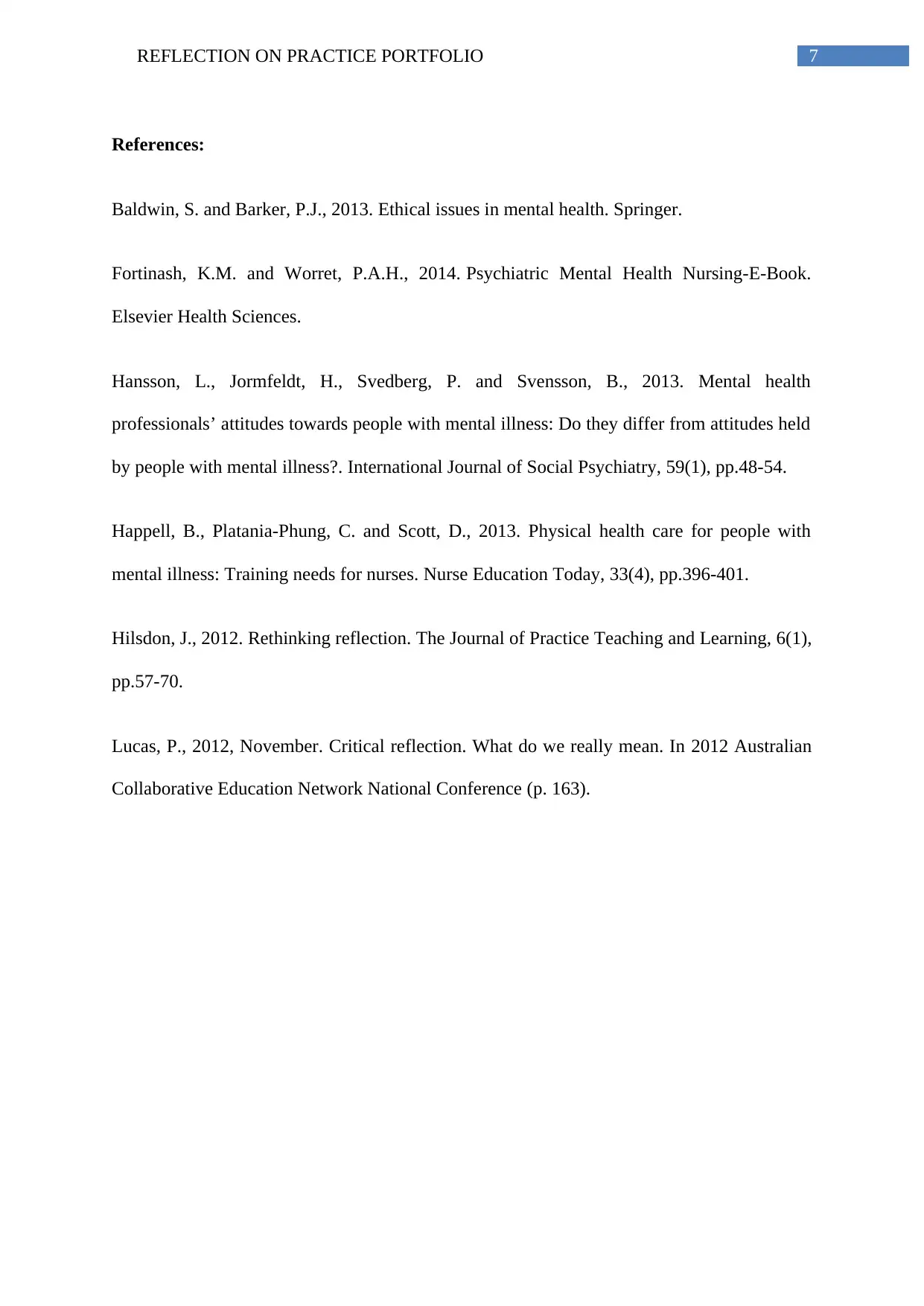
7REFLECTION ON PRACTICE PORTFOLIO
References:
Baldwin, S. and Barker, P.J., 2013. Ethical issues in mental health. Springer.
Fortinash, K.M. and Worret, P.A.H., 2014. Psychiatric Mental Health Nursing-E-Book.
Elsevier Health Sciences.
Hansson, L., Jormfeldt, H., Svedberg, P. and Svensson, B., 2013. Mental health
professionals’ attitudes towards people with mental illness: Do they differ from attitudes held
by people with mental illness?. International Journal of Social Psychiatry, 59(1), pp.48-54.
Happell, B., Platania-Phung, C. and Scott, D., 2013. Physical health care for people with
mental illness: Training needs for nurses. Nurse Education Today, 33(4), pp.396-401.
Hilsdon, J., 2012. Rethinking reflection. The Journal of Practice Teaching and Learning, 6(1),
pp.57-70.
Lucas, P., 2012, November. Critical reflection. What do we really mean. In 2012 Australian
Collaborative Education Network National Conference (p. 163).
References:
Baldwin, S. and Barker, P.J., 2013. Ethical issues in mental health. Springer.
Fortinash, K.M. and Worret, P.A.H., 2014. Psychiatric Mental Health Nursing-E-Book.
Elsevier Health Sciences.
Hansson, L., Jormfeldt, H., Svedberg, P. and Svensson, B., 2013. Mental health
professionals’ attitudes towards people with mental illness: Do they differ from attitudes held
by people with mental illness?. International Journal of Social Psychiatry, 59(1), pp.48-54.
Happell, B., Platania-Phung, C. and Scott, D., 2013. Physical health care for people with
mental illness: Training needs for nurses. Nurse Education Today, 33(4), pp.396-401.
Hilsdon, J., 2012. Rethinking reflection. The Journal of Practice Teaching and Learning, 6(1),
pp.57-70.
Lucas, P., 2012, November. Critical reflection. What do we really mean. In 2012 Australian
Collaborative Education Network National Conference (p. 163).
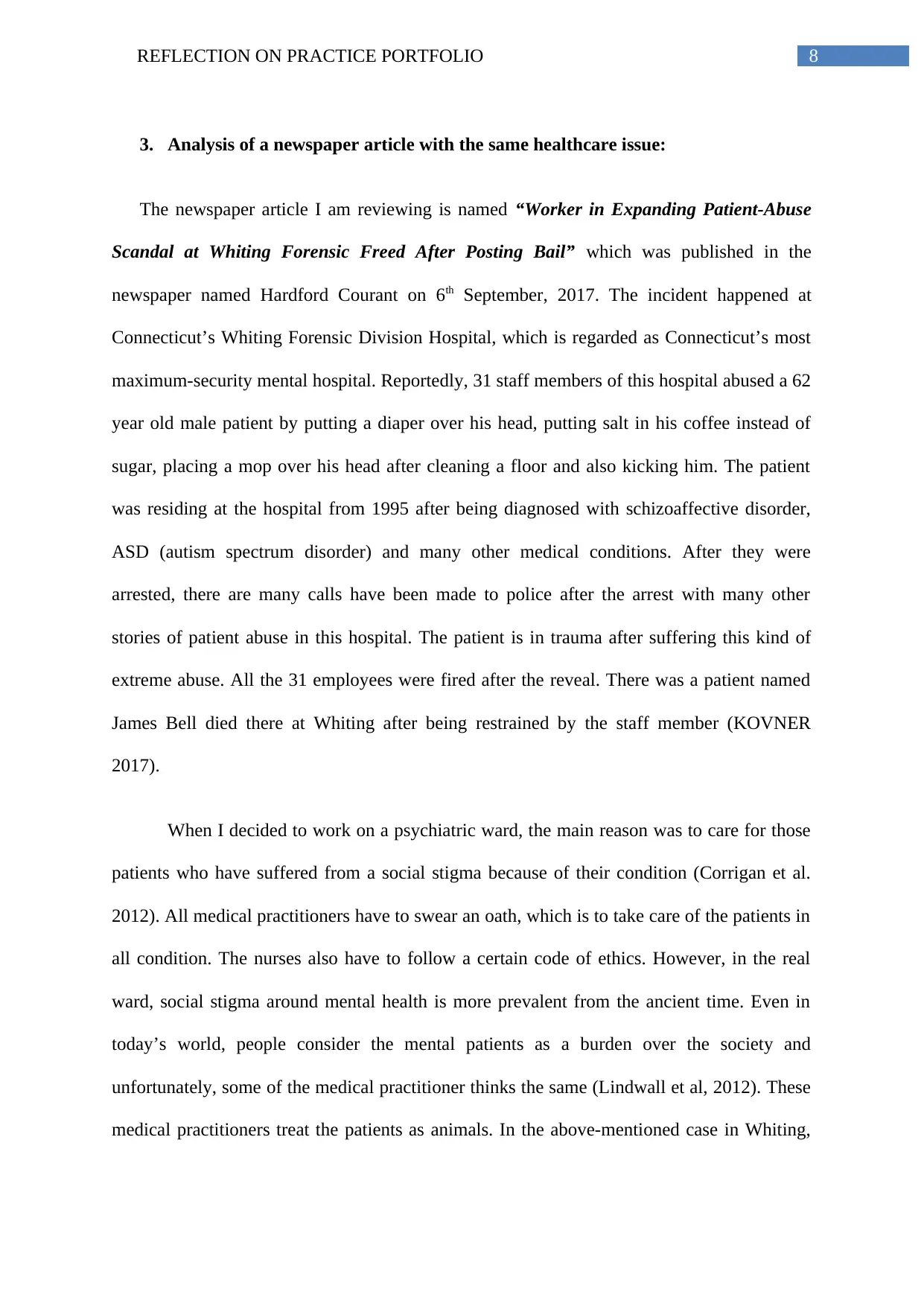
8REFLECTION ON PRACTICE PORTFOLIO
3. Analysis of a newspaper article with the same healthcare issue:
The newspaper article I am reviewing is named “Worker in Expanding Patient-Abuse
Scandal at Whiting Forensic Freed After Posting Bail” which was published in the
newspaper named Hardford Courant on 6th September, 2017. The incident happened at
Connecticut’s Whiting Forensic Division Hospital, which is regarded as Connecticut’s most
maximum-security mental hospital. Reportedly, 31 staff members of this hospital abused a 62
year old male patient by putting a diaper over his head, putting salt in his coffee instead of
sugar, placing a mop over his head after cleaning a floor and also kicking him. The patient
was residing at the hospital from 1995 after being diagnosed with schizoaffective disorder,
ASD (autism spectrum disorder) and many other medical conditions. After they were
arrested, there are many calls have been made to police after the arrest with many other
stories of patient abuse in this hospital. The patient is in trauma after suffering this kind of
extreme abuse. All the 31 employees were fired after the reveal. There was a patient named
James Bell died there at Whiting after being restrained by the staff member (KOVNER
2017).
When I decided to work on a psychiatric ward, the main reason was to care for those
patients who have suffered from a social stigma because of their condition (Corrigan et al.
2012). All medical practitioners have to swear an oath, which is to take care of the patients in
all condition. The nurses also have to follow a certain code of ethics. However, in the real
ward, social stigma around mental health is more prevalent from the ancient time. Even in
today’s world, people consider the mental patients as a burden over the society and
unfortunately, some of the medical practitioner thinks the same (Lindwall et al, 2012). These
medical practitioners treat the patients as animals. In the above-mentioned case in Whiting,
3. Analysis of a newspaper article with the same healthcare issue:
The newspaper article I am reviewing is named “Worker in Expanding Patient-Abuse
Scandal at Whiting Forensic Freed After Posting Bail” which was published in the
newspaper named Hardford Courant on 6th September, 2017. The incident happened at
Connecticut’s Whiting Forensic Division Hospital, which is regarded as Connecticut’s most
maximum-security mental hospital. Reportedly, 31 staff members of this hospital abused a 62
year old male patient by putting a diaper over his head, putting salt in his coffee instead of
sugar, placing a mop over his head after cleaning a floor and also kicking him. The patient
was residing at the hospital from 1995 after being diagnosed with schizoaffective disorder,
ASD (autism spectrum disorder) and many other medical conditions. After they were
arrested, there are many calls have been made to police after the arrest with many other
stories of patient abuse in this hospital. The patient is in trauma after suffering this kind of
extreme abuse. All the 31 employees were fired after the reveal. There was a patient named
James Bell died there at Whiting after being restrained by the staff member (KOVNER
2017).
When I decided to work on a psychiatric ward, the main reason was to care for those
patients who have suffered from a social stigma because of their condition (Corrigan et al.
2012). All medical practitioners have to swear an oath, which is to take care of the patients in
all condition. The nurses also have to follow a certain code of ethics. However, in the real
ward, social stigma around mental health is more prevalent from the ancient time. Even in
today’s world, people consider the mental patients as a burden over the society and
unfortunately, some of the medical practitioner thinks the same (Lindwall et al, 2012). These
medical practitioners treat the patients as animals. In the above-mentioned case in Whiting,
⊘ This is a preview!⊘
Do you want full access?
Subscribe today to unlock all pages.

Trusted by 1+ million students worldwide
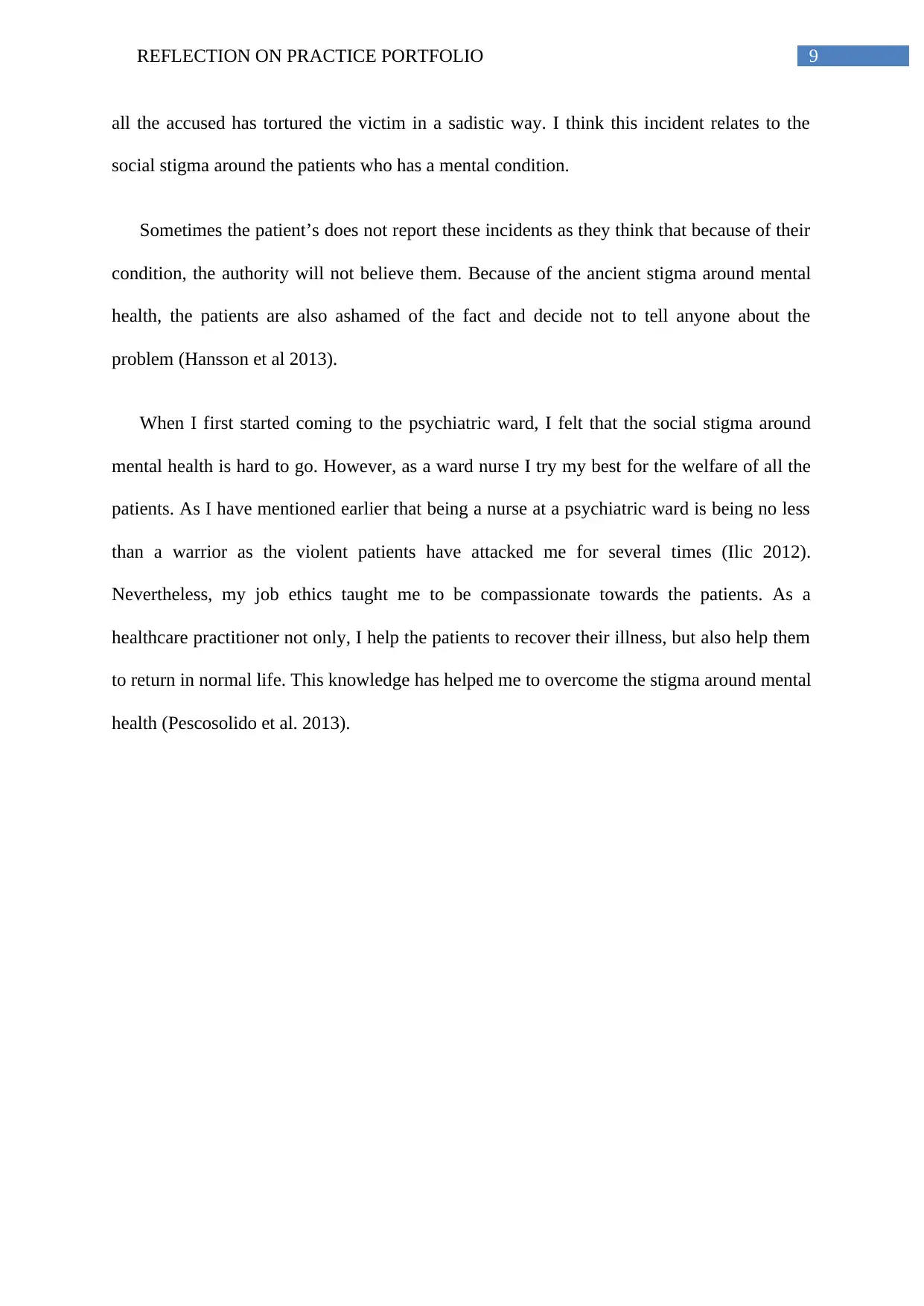
9REFLECTION ON PRACTICE PORTFOLIO
all the accused has tortured the victim in a sadistic way. I think this incident relates to the
social stigma around the patients who has a mental condition.
Sometimes the patient’s does not report these incidents as they think that because of their
condition, the authority will not believe them. Because of the ancient stigma around mental
health, the patients are also ashamed of the fact and decide not to tell anyone about the
problem (Hansson et al 2013).
When I first started coming to the psychiatric ward, I felt that the social stigma around
mental health is hard to go. However, as a ward nurse I try my best for the welfare of all the
patients. As I have mentioned earlier that being a nurse at a psychiatric ward is being no less
than a warrior as the violent patients have attacked me for several times (Ilic 2012).
Nevertheless, my job ethics taught me to be compassionate towards the patients. As a
healthcare practitioner not only, I help the patients to recover their illness, but also help them
to return in normal life. This knowledge has helped me to overcome the stigma around mental
health (Pescosolido et al. 2013).
all the accused has tortured the victim in a sadistic way. I think this incident relates to the
social stigma around the patients who has a mental condition.
Sometimes the patient’s does not report these incidents as they think that because of their
condition, the authority will not believe them. Because of the ancient stigma around mental
health, the patients are also ashamed of the fact and decide not to tell anyone about the
problem (Hansson et al 2013).
When I first started coming to the psychiatric ward, I felt that the social stigma around
mental health is hard to go. However, as a ward nurse I try my best for the welfare of all the
patients. As I have mentioned earlier that being a nurse at a psychiatric ward is being no less
than a warrior as the violent patients have attacked me for several times (Ilic 2012).
Nevertheless, my job ethics taught me to be compassionate towards the patients. As a
healthcare practitioner not only, I help the patients to recover their illness, but also help them
to return in normal life. This knowledge has helped me to overcome the stigma around mental
health (Pescosolido et al. 2013).
Paraphrase This Document
Need a fresh take? Get an instant paraphrase of this document with our AI Paraphraser
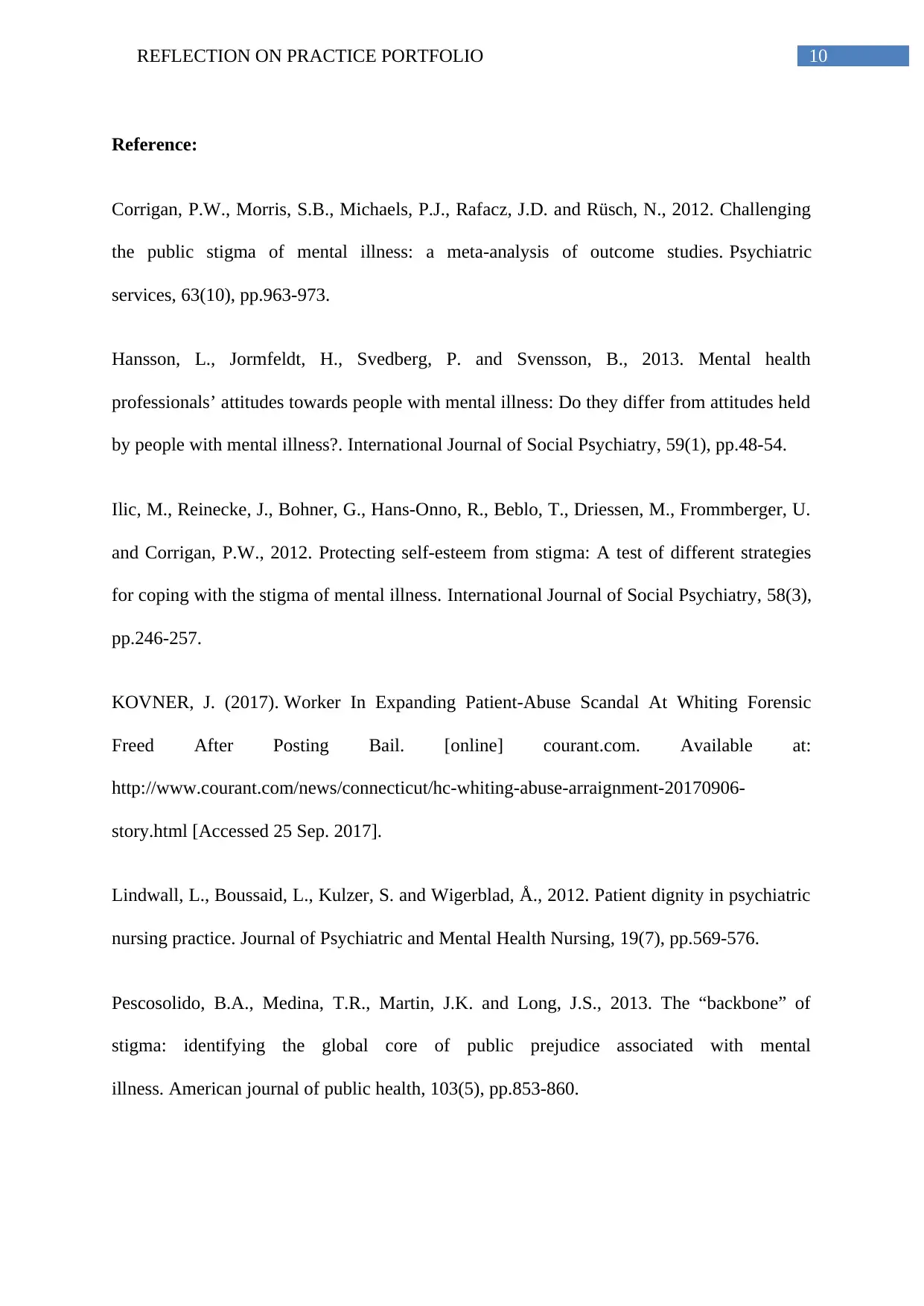
10REFLECTION ON PRACTICE PORTFOLIO
Reference:
Corrigan, P.W., Morris, S.B., Michaels, P.J., Rafacz, J.D. and Rüsch, N., 2012. Challenging
the public stigma of mental illness: a meta-analysis of outcome studies. Psychiatric
services, 63(10), pp.963-973.
Hansson, L., Jormfeldt, H., Svedberg, P. and Svensson, B., 2013. Mental health
professionals’ attitudes towards people with mental illness: Do they differ from attitudes held
by people with mental illness?. International Journal of Social Psychiatry, 59(1), pp.48-54.
Ilic, M., Reinecke, J., Bohner, G., Hans-Onno, R., Beblo, T., Driessen, M., Frommberger, U.
and Corrigan, P.W., 2012. Protecting self-esteem from stigma: A test of different strategies
for coping with the stigma of mental illness. International Journal of Social Psychiatry, 58(3),
pp.246-257.
KOVNER, J. (2017). Worker In Expanding Patient-Abuse Scandal At Whiting Forensic
Freed After Posting Bail. [online] courant.com. Available at:
http://www.courant.com/news/connecticut/hc-whiting-abuse-arraignment-20170906-
story.html [Accessed 25 Sep. 2017].
Lindwall, L., Boussaid, L., Kulzer, S. and Wigerblad, Å., 2012. Patient dignity in psychiatric
nursing practice. Journal of Psychiatric and Mental Health Nursing, 19(7), pp.569-576.
Pescosolido, B.A., Medina, T.R., Martin, J.K. and Long, J.S., 2013. The “backbone” of
stigma: identifying the global core of public prejudice associated with mental
illness. American journal of public health, 103(5), pp.853-860.
Reference:
Corrigan, P.W., Morris, S.B., Michaels, P.J., Rafacz, J.D. and Rüsch, N., 2012. Challenging
the public stigma of mental illness: a meta-analysis of outcome studies. Psychiatric
services, 63(10), pp.963-973.
Hansson, L., Jormfeldt, H., Svedberg, P. and Svensson, B., 2013. Mental health
professionals’ attitudes towards people with mental illness: Do they differ from attitudes held
by people with mental illness?. International Journal of Social Psychiatry, 59(1), pp.48-54.
Ilic, M., Reinecke, J., Bohner, G., Hans-Onno, R., Beblo, T., Driessen, M., Frommberger, U.
and Corrigan, P.W., 2012. Protecting self-esteem from stigma: A test of different strategies
for coping with the stigma of mental illness. International Journal of Social Psychiatry, 58(3),
pp.246-257.
KOVNER, J. (2017). Worker In Expanding Patient-Abuse Scandal At Whiting Forensic
Freed After Posting Bail. [online] courant.com. Available at:
http://www.courant.com/news/connecticut/hc-whiting-abuse-arraignment-20170906-
story.html [Accessed 25 Sep. 2017].
Lindwall, L., Boussaid, L., Kulzer, S. and Wigerblad, Å., 2012. Patient dignity in psychiatric
nursing practice. Journal of Psychiatric and Mental Health Nursing, 19(7), pp.569-576.
Pescosolido, B.A., Medina, T.R., Martin, J.K. and Long, J.S., 2013. The “backbone” of
stigma: identifying the global core of public prejudice associated with mental
illness. American journal of public health, 103(5), pp.853-860.
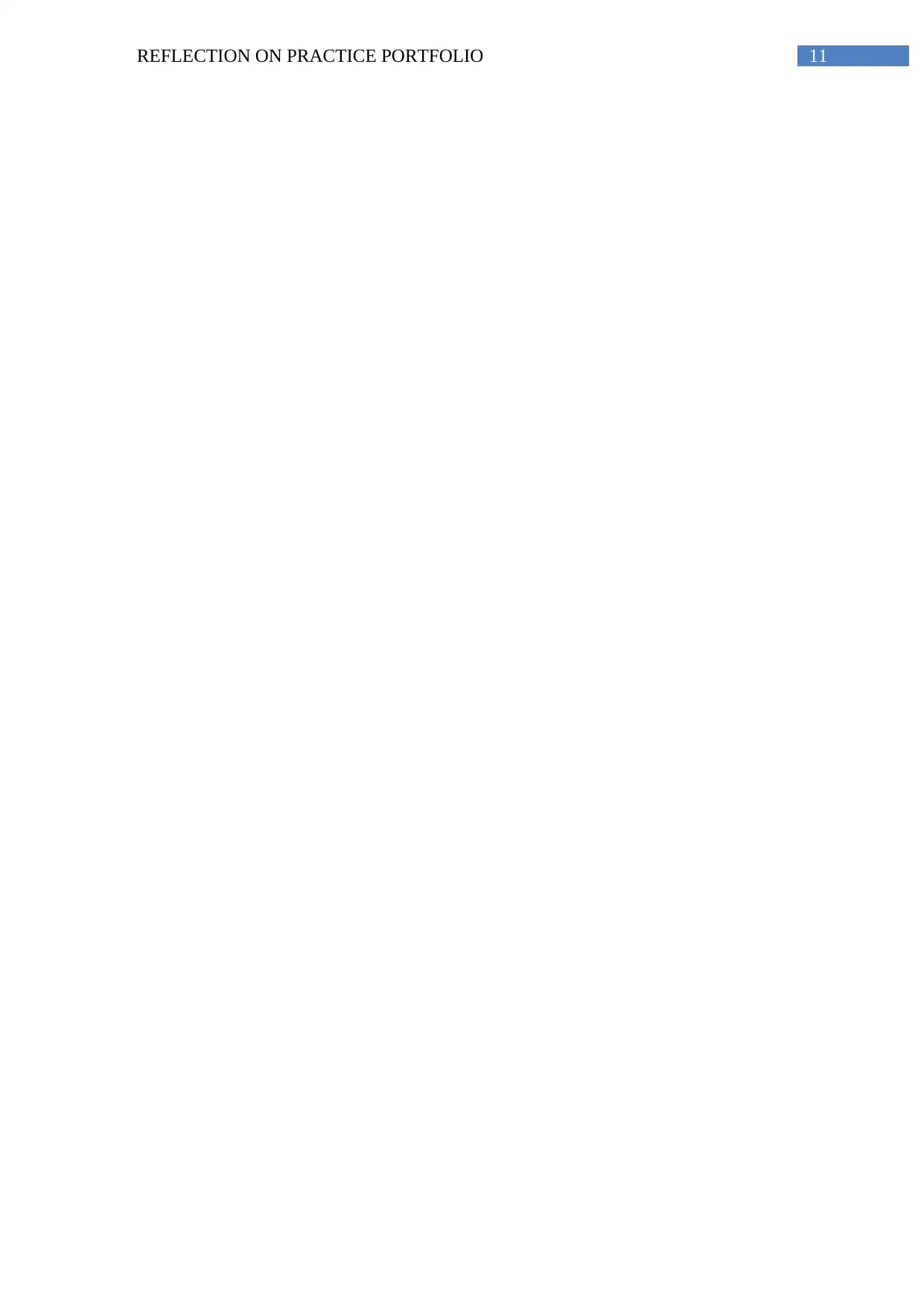
11REFLECTION ON PRACTICE PORTFOLIO
⊘ This is a preview!⊘
Do you want full access?
Subscribe today to unlock all pages.

Trusted by 1+ million students worldwide
1 out of 14
Your All-in-One AI-Powered Toolkit for Academic Success.
+13062052269
info@desklib.com
Available 24*7 on WhatsApp / Email
![[object Object]](/_next/static/media/star-bottom.7253800d.svg)
Unlock your academic potential
Copyright © 2020–2026 A2Z Services. All Rights Reserved. Developed and managed by ZUCOL.
